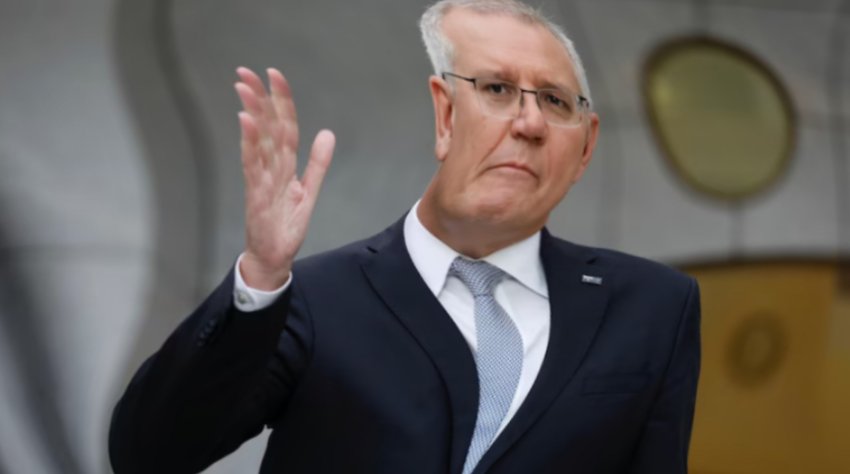
Born from the dark well of swill and advertising, former Prime Minister Scott Morrison was always the apotheosis of politics’ worst tendencies: shallow form, public service for private interest, and, ultimately, the scrap for survival at the expense of the grand vision.
In a January 23 social media post, Morrison announced his decision to — and here his priorities are clear — “leave parliament at the end of February to take on new challenges in the global corporate sector and spend more time with my family”.
Making the announcement now would “give my party ample time to select a great new candidate who I know will do what’s best for our community and bring fresh energy and commitment to the job”.
This was the sort of thing he should have done months ago.
As federal member for Cook, Morrison’s lack of attention to his local seat must surely have been noted after his defeat in May 2022. Local representation, if taken seriously, is a series of constituency concerns and attending events.
It’s hard to tend to such things if you are on the payroll of the conservative Hudson Institute Board of Trustees, being praised for countering “an increasingly assertive China in the Indo Pacific and beyond” or spending time in Israel praising that state’s execrable efforts in quashing aspirations for Palestinian statehood.
None of this bothers the departing Morrison. He says in his official statement of departure that he was “able to deliver new and upgraded sport and community infrastructure, such as major upgrades to our local surf clubs and new artistic installations and visitor facilities being provided at Cook’s landing site at Kurnell”.
Let’s not forget the charity work, the grants programs, and the activities he had a minimal hand in.
There lies Morrison’s talent: greased enough to wriggle out of failure; and opportunistic enough to take credit for others’ successes.
Take one example. Australia’s attempts to prevent the transmission and spread of COVID-19, during the global pandemic, was mostly aided by the variable policies of states and territories.
The Commonwealth merely turned off the tap to visitors and, scandalously, Australian citizens desperate to return. Stranded, often impecunious, and left without resources in countries being ravaged by the coronavirus, such citizens were demonised rather than aided.
Morrison’s sole obligation, at that point, was to make sure that vaccines being developed would be made available to the public in due course. Instead of ensuring standard, ready supply when the time came, the rollout, as it was termed, was a stuttering affair.
But the then-PM had a familiar retort: global supply lines had been “choked”. Again, he wasn’t to blame.
The list of errors and stumbles is extensive, showing varying degrees of callousness and indifference.
When parts of the country were being incinerated by climate-induced bush fires in late 2019, he took a holiday to Hawaii.
He was forced to admit “regret” for “any offence caused to any of the many Australians affected by the terrible bushfires by my taking leave with family at this time”.
He loved the fossil fuel industry with such a passion he brought a lump of coal into Parliament.
He issued directives that the words “climate change” would not feature in talks Australian diplomats would participate in. He scorned the Pacific Island states for worrying about disappearing under the sea because Australia was not pulling its weight in cutting greenhouse gas emissions.
As immigration minister, Morrison ran the Tony Abbot government’s “turn back the boats” policy treating the naval arrival of refugees and asylum seekers as a national security threat.
Towing boats out to sea, bribing traffickers to return with their human quarry and sending broken, traumatised people to such Pacific prison outposts as Manus Island and Nauru, were all cloaked in the secrecy of Operation Sovereign Borders.
When the New York Times interviewed Morrison after becoming Prime Minister, it noticed “His office features a model migrant boat bearing the proud declaration ‘I Stopped These’”.
His qualifications as a dinner circuit speaker, lecturer, advisor and an outrageously paid consultant, are next to nil.
But near the cusp of talent’s infinite absence, opportunities bloom.
For the corporate entities and think tanks, keen to ensure the enduring power of the US imperium, what mattered was that he was Washington’s stalking horse in the Indo-Pacific.
Eventually, Morrison proved to be more than just that. He would go so far as to sell off Australian sovereignty for a song, via the AUKUS security agreement promising nuclear-powered submarines, leaving the Australian taxpayer in bondage to Washington for the next half-century.
If English writer Samuel Johnson was right in calling patriotism the last refuge of the scoundrel, he would have had someone like Morrison in mind: the figure who uses patriotism as a guise for his own scoundrel cunning.
[Binoy Kampmark currently lectures at RMIT University.]